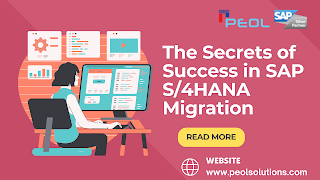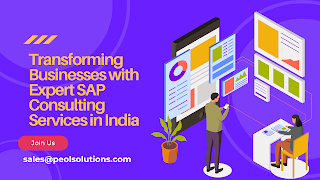The Future of SAP Consulting: AI, Cloud and Automation in Enterprise Transformation
Introduction
Understanding the Changing Role of SAP Consulting
Traditionally, SAP consulting was all about system implementation and process optimization. However, the future of SAP consulting extends far beyond technical execution.
The Power of AI in SAP Consulting
Artificial Intelligence is one of the most transformative forces in SAP’s ecosystem. With machine learning algorithms, predictive analytics, and intelligent automation, SAP solutions are becoming smarter and more responsive than ever.
AI in SAP is being leveraged to:
Predict business outcomes: Machine learning models can forecast sales, inventory needs, and financial risks based on real-time data.
Automate decision-making: AI-driven insights help companies take quick, informed actions without manual intervention.
Boost customer experience: Intelligent chatbots and recommendation engines improve personalization and responsiveness.Optimize business processes: From supply chain management to HR operations, AI helps identify inefficiencies and suggest process improvements.
SAP’s Business Technology Platform (BTP) and SAP Leonardo are great examples of how AI is seamlessly integrated into enterprise applications.
Cloud Computing: The Foundation of the Modern SAP Landscape
As organizations embrace digital transformation, cloud computing has emerged as the new standard for SAP deployments. SAP’s transition from on-premises solutions to SAP S/4HANA Cloud and RISE with SAP has changed how enterprises manage their IT infrastructure.
Here’s why cloud is transforming SAP consulting:
Scalability and Flexibility: Cloud-based SAP solutions allow businesses to scale resources as needed without investing in expensive hardware.
Cost Efficiency: Subscription-based models reduce upfront costs, making enterprise-grade SAP solutions accessible to small and medium-sized businesses.
Real-time Updates: Cloud enables continuous innovation with automatic updates, ensuring that businesses always have access to the latest features.
Enhanced Collaboration: Cloud platforms support seamless integration across departments and geographies, improving teamwork and data accessibility.
Disaster Recovery and Security: Cloud hosting provides robust backup and security protocols that protect mission-critical data.
Automation: Driving Efficiency and Accuracy
Automation is another pillar of the future of SAP consulting. As businesses look for ways to reduce manual effort and human error, Robotic Process Automation (RPA) and intelligent workflows are taking center stage. SAP’s Intelligent Robotic Process Automation (iRPA) enables enterprises to automate repetitive tasks such as data entry, report generation, and invoice processing.
Save time on routine operations.
Improve accuracy and compliance.
Free up employees for higher-value work.
Ensure faster and more consistent results.
For consultants, understanding automation tools and frameworks is essential to delivering modern SAP solutions.
Integrating AI, Cloud, and Automation for End-to-End Transformation
The true power of digital transformation lies in integration.
For
AI-driven insights hosted
in the cloud can guide automated workflows in real time.Cloud-based data lakes can train machine learning models that optimize supply chains or predict customer behavior.
Automated systems can monitor business KPIs and trigger AI-powered alerts when anomalies are detected.
This holistic approach allows SAP consultants to design systems that are not only efficient but also
The Future Skills of SAP Consultants
As technology evolves, so do the skills required in SAP consulting. Tomorrow’s consultants will need a blend of technical expertise, strategic thinking, and business acumen.
Key skills shaping the future of SAP consulting include:
Proficiency in AI/ML tools and understanding predictive analytics.
Cloud migration and management expertise, particularly in SAP S/4HANA Cloud.
Knowledge of automation frameworks such as iRPA, ABAP automation, and process orchestration.
Data analytics and visualization using SAP Analytics Cloud.
Cybersecurity awareness to protect sensitive enterprise data.
Change management and communication to ensure smooth digital adoption.
Continuous learning, certification, and exposure to new SAP modules will be vital for consultants to remain competitive in this evolving landscape.
Challenges Ahead in the SAP Consulting Industry
While the future looks promising, the journey toward transformation is not without challenges. Some of the biggest hurdles include:
Skill gaps: Rapid technological shifts create a shortage of professionals trained in AI and cloud-based SAP systems.
Data integration issues: Migrating from legacy systems to cloud environments can lead to compatibility challenges.
Cost of transformation: Although cloud solutions offer long-term savings, initial transition costs can be high.
Change resistance: Organizations often face internal resistance when adapting to new technologies or workflows.
However, SAP consultants who can anticipate and address these challenges will play a critical role in ensuring successful transformations.
Conclusion
As AI, cloud, and automation continue to shape the enterprise world, SAP consulting is entering its most exciting phase yet. Businesses that embrace these technologies will enjoy unparalleled efficiency, innovation, and scalability.
For More Details:
Call: +91-8040905243
Mail: sales@peolsolutions.com
Visit: www.peolsolutions.com




Comments
Post a Comment